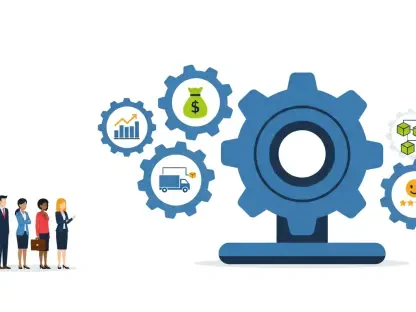In today’s fast-paced business environment, imagine a world where enterprise systems not only process data but anticipate needs, streamline operations, and drive strategic decisions with uncanny precision, transforming the way companies operate. This is no longer a distant vision but a reality being shaped by artificial intelligence (AI) within the enterprise technology sector. As companies grapple with unprecedented data volumes and complex operational challenges, SAP, a global leader in enterprise applications, stands at the forefront of this transformation, redefining what it means to be an intelligent enterprise through innovative AI and data-driven solutions. This report explores SAP’s strategic initiatives, the broader industry landscape, and the implications for businesses navigating this technological revolution.
Understanding the Enterprise Technology Landscape
The enterprise technology sector is undergoing a seismic shift, driven by the rapid integration of AI into core business operations. Organizations across industries are leveraging AI to enhance decision-making, optimize processes, and unlock new revenue streams, with the technology becoming a cornerstone of competitive advantage. Key segments such as enterprise resource planning, customer relationship management, and data management are witnessing unprecedented innovation, with AI acting as a catalyst for efficiency and insight. Major players like SAP, Oracle, Salesforce, and Workday are vying for dominance, each pushing the boundaries of what integrated systems can achieve in a digital-first world.
Beyond AI, technological advancements such as cloud computing and advanced data analytics are reshaping how businesses operate, offering scalability and real-time insights that were previously unattainable. Cloud platforms enable seamless access to applications and data, while analytics tools empower companies to derive actionable intelligence from vast datasets. However, this rapid evolution is not without constraints, as regulatory compliance around data privacy and AI ethics becomes increasingly critical. Businesses must navigate stringent standards to ensure responsible usage, balancing innovation with accountability in an era of heightened scrutiny.
SAP’s Strategic Shift to AI and Data-Driven Solutions
Key Innovations and Trends Driving SAP’s Approach
SAP has embarked on a transformative journey, positioning itself as a data-centric powerhouse with initiatives like the Business Data Cloud (BDC). This platform consolidates vast reserves of business data to fuel AI capabilities, enabling the development of specialized AI agents and personalized Joule assistants across its application suite. These tools aim to enhance user experiences by providing tailored support and insights, marking a significant departure from traditional enterprise software models toward a more adaptive and intuitive framework.
A prominent trend in SAP’s strategy is the focus on end-to-end process integration, designed to dismantle organizational silos that hinder efficiency. By ensuring applications work cohesively, SAP enables businesses to execute seamless workflows, resulting in smarter decisions and accelerated outcomes. Additionally, market drivers such as the growing demand for productivity and the pursuit of growth are shaping SAP’s direction, opening opportunities for customized AI deployments that cater to specific industry needs and individual business challenges.
Market Impact and Growth Potential
In the competitive landscape, SAP’s integration of AI sets it apart, though rivals like Oracle and Salesforce are also advancing similar capabilities. SAP’s emphasis on data harmonization through the BDC provides a robust foundation for AI-driven outcomes, positioning it favorably against competitors who may prioritize different aspects of technology integration. Analysts note that SAP’s approach aligns with industry-wide recognition of data as the bedrock of successful AI implementation, giving it a strategic edge in delivering measurable business value.
Looking ahead, projections indicate a sharp rise in AI adoption rates within enterprise solutions over the next few years, with significant improvements expected in operational efficiency and revenue generation. Industry consensus suggests that by harmonizing data across platforms, companies can unlock the full potential of AI, driving transformative results. SAP’s current trajectory suggests strong growth potential, particularly as businesses increasingly seek integrated systems to navigate complex market dynamics.
Challenges in Implementing AI for the Intelligent Enterprise
The path to an intelligent enterprise is fraught with obstacles, both technological and organizational, that SAP and the broader industry must address. Fragmented systems remain a persistent issue, as disparate applications often mirror internal silos, impeding the flow of data and insights. This fragmentation complicates AI integration, requiring substantial effort to unify diverse platforms into a coherent ecosystem capable of supporting advanced capabilities.
Moreover, ensuring data security and privacy in AI implementations poses a significant challenge, as breaches or misuse can erode trust and invite regulatory penalties. Market pressures also play a role, with businesses demanding clear evidence of return on investment (ROI) for AI initiatives, a concern SAP tackles through tools like its ROI Estimator. This tool aims to quantify benefits, helping to justify expenditures by providing tangible metrics, though proving long-term value remains an uphill battle for many organizations.
To overcome these barriers, strategies such as fostering cross-departmental collaboration and investing in robust cybersecurity measures are essential. SAP’s focus on integrated solutions offers a potential roadmap, as does its commitment to providing resources that bridge the gap between innovation and practical application. Addressing these challenges will be critical for widespread adoption and sustained success in the intelligent enterprise paradigm.
Navigating the Regulatory and Compliance Landscape
The regulatory environment surrounding AI and data usage in enterprise technology is becoming increasingly complex, with privacy and security standards at the forefront. Global frameworks demand strict adherence to guidelines that protect sensitive information, compelling companies to embed compliance into their AI strategies. Failure to meet these requirements can result in significant financial and reputational consequences, making governance a top priority for industry leaders.
SAP demonstrates a proactive stance by incorporating strong governance mechanisms within the Business Data Cloud, ensuring that AI operations align with legal and ethical standards. Strategic partnerships with technology providers further bolster its compliance efforts, facilitating adherence to evolving regulations. This commitment reflects a broader industry trend of prioritizing responsible innovation, as companies strive to maintain customer trust while pushing technological boundaries.
Balancing innovation with regulatory requirements remains a delicate act, as overly restrictive policies can stifle progress, while lax oversight risks misuse. The influence of regulatory changes is evident in shifting industry practices, with many firms adopting more transparent data handling processes. SAP’s approach serves as a model for navigating this landscape, illustrating how compliance can coexist with cutting-edge advancements in enterprise solutions.
The Future of the Intelligent Enterprise with SAP and AI
SAP’s vision for the intelligent enterprise continues to evolve, with emerging technologies like advanced AI agents poised to redefine business interactions. These agents, supported by platforms like the BDC, promise to automate complex tasks and deliver predictive insights, enhancing decision-making at unprecedented levels. This direction signals a future where enterprise systems are not just tools but proactive partners in strategic growth.
Market disruptors, including evolving customer expectations for simplified, integrated solutions, are shaping SAP’s roadmap. Businesses now demand platforms that reduce complexity while driving productivity, a trend that aligns with SAP’s focus on seamless application suites. Growth areas such as AI-driven operational efficiency and personalized user experiences present significant opportunities for expansion and differentiation in a crowded market.
Global competition and economic conditions also influence the trajectory of enterprise technology, with innovation races among major players accelerating advancements. SAP must navigate these dynamics while addressing potential challenges like fluctuating investment climates or geopolitical tensions. Staying ahead will require continuous adaptation, leveraging its data-centric foundation to meet diverse customer needs and maintain leadership in this transformative space.
Conclusion: SAP’s Vision and Industry Implications
Reflecting on SAP’s journey, it becomes evident that its role in redefining the intelligent enterprise through AI and data integration marks a pivotal shift in the industry. The strategic emphasis on harmonizing data via the Business Data Cloud, coupled with innovative tools like Joule assistants, positions SAP as a trailblazer in delivering actionable business outcomes. This transformation underscores a broader movement within the sector toward integrated, customer-focused solutions that address real-world challenges.
For businesses aiming to capitalize on these advancements, the next steps involve assessing internal data readiness and exploring partnerships with platforms like SAP to streamline AI adoption. Investing in training and change management emerges as critical to overcoming resistance and maximizing technology benefits. Looking ahead, companies need to monitor competitive innovations and regulatory shifts, ensuring agility in a rapidly evolving landscape while prioritizing sustainable growth through intelligent enterprise strategies.









